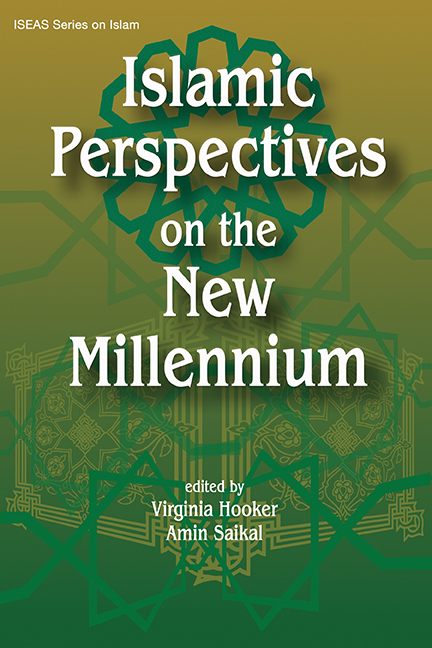Book contents
- Frontmatter
- Contents
- Acknowledgements
- Contributors
- 1 Islamic Perspectives on the New Millennium
- The New World Order
- The New Age
- The Economy
- The Nation-State
- 8 Political Islam in Post-Soeharto Indonesia
- 9 The Experience of the Islamic Republic of Iran
- Muslim Women
- Law and Knowledge
- Conclusion
- Glossary
- Index of Names
- Index of Subjects
8 - Political Islam in Post-Soeharto Indonesia
from The Nation-State
Published online by Cambridge University Press: 21 October 2015
- Frontmatter
- Contents
- Acknowledgements
- Contributors
- 1 Islamic Perspectives on the New Millennium
- The New World Order
- The New Age
- The Economy
- The Nation-State
- 8 Political Islam in Post-Soeharto Indonesia
- 9 The Experience of the Islamic Republic of Iran
- Muslim Women
- Law and Knowledge
- Conclusion
- Glossary
- Index of Names
- Index of Subjects
Summary
The dawn of the new millennium has brought not only euphoria to citizens of the world, but also hopes of better political and economic lives for Muslims. By the same token, the new millennium brings increasing anxiety among Muslims as tendencies, which have gained momentum over the last decade, intensify.
As Liddle and Mujani (2000) rightly argue, one of the most evident tendencies in the post-Cold War period up until the new millennium was the rapid growth of democracies, or at least there was a strong tendency that increasing numbers of nation-states are becoming more democratic. This tendency, as both scholars further point out, seems not to be taking place in dominant or predominant Muslim states in the Islamic world as a whole. As a result, the old question regarding Islam and democracy: whether or not Islam could play a more positive role in the new wave of democracy, once again becomes a subject of heated discussion both from within Muslim communities and without (cf. Esposito and Voll 1996; Eickelman and Piscatori 1996).
The discussions and debates on the relationship between Islam and democracy have once again come to the fore in Indonesia in the aftermath of the fall of Soeharto. This has much to do with the rise of “political Islam” which appears to be one of the most visible political developments in post-Soeharto Indonesia. It can be clearly observed in several tendencies. First, the establishment of a great number of ldquo;Islamic parties” which mostly adopt Islam as their basis replacing Pancasila that used to be the sole basis of any organization; second, the increasing demands from certain groups among Muslims for the official adoption and implementation of shari'a; and third, the proliferation of Muslim groups considered by many as radicals, such as Lasykar Jihad (Jihad Troops), Front Pembela Islam (FPI, or Islamic Defence Front), Hizb al-Tahrir (Party of Liberation), and Angkatan Mujahidin Indonesia (the Jihad Fighter Group of Indonesia) (cf. Bamualim et al. 2000). The three developments — by no means exhaustive — appear to some to represent the return of the idea of the Islamic state in Indonesia, and this could supposedly bring the future of democracy and pluralism in Indonesia into question.
- Type
- Chapter
- Information
- Islamic Perspectives on the New Millennium , pp. 133 - 149Publisher: ISEAS–Yusof Ishak InstitutePrint publication year: 2004

